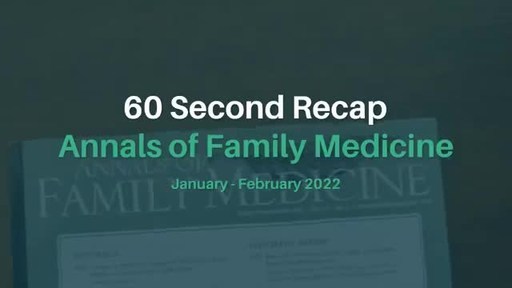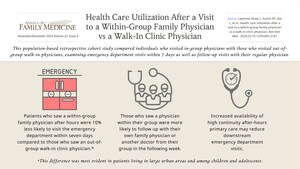Annals of Family Medicine: Telementoring Program with Chat Box Feature Helps Meet Clinicians' Needs for Information, Resources and Peer Support
ANN ARBOR, Mich., Jan. 25, 2022 /PRNewswire/ -- Researchers from Oregon Health & Science University found that a clinician-focused, COVID-19 support program with a chat box feature not only provided primary care medical staff with timely clinical resources and care guidance, but it also offered other psychosocial supports.
The ECHO program, created in March 2020, included 11 sessions with researchers encouraging interactions among the hundreds of participants via a chat box. Their objective was to assess how chat box communications could provide support to clinicians during the pandemic.
Researchers conducted a qualitative analysis of text extracted from the sessions, exploring the context of clinicians' needs, as conceptualized by Maslow's hierarchy of needs, and adapted specifically for clinicians. Three key themes emerged: answers and trustworthy information, practical resources, and affirmation and peer support.
The chat box supported many clinicians' needs during a rapidly changing healthcare environment, including the ability to ask questions and provide comments. Participants were able to create a community through chat box use where colleagues provided connection and validation, as well as a forum for discussing fears, concerns, and grievances.
Many participants also used the platform to marshal additional resources and support for patients from marginalized groups, or for those with special health needs. This patient advocacy role, the researchers note, is a demonstration of self-actualization, as defined by Maslow.
"Telementoring programs that provide opportunities for robust participant interactions – with their ability to both disseminate evidence-based information quickly and provide peer-to-peer support – should continue to play an integral role in responding to health crises in the future," the authors write.
"Identifying and meeting clinicians' needs during a pandemic, or any public health crisis, is critical for primary care as a discipline to reach its full potential," they add, and includes the need for greater investment in both public health and primary care. These investments should include adequate personal protective equipment as well as furnishing the time to reflect on what has occurred thus far during the current pandemic and to better plan for any future health crises.
Anna L. Steeves-Reece, PhD candidate, MPH, MA, et al
Oregon Rural Practice-based Research Network, Oregon Health & Science University, Portland, Oregon
SOURCE Annals of Family Medicine

WANT YOUR COMPANY'S NEWS FEATURED ON PRNEWSWIRE.COM?
Newsrooms &
Influencers
Digital Media
Outlets
Journalists
Opted In







Share this article